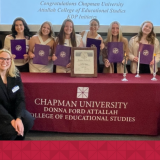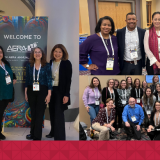Dr. Peter McLaren Assumes Co-Director Role with the Paulo Freire Democratic Project
December 17, 2014
The College of Educational Studies formalized the Paulo Freire Democratic Project (PFDP) in 1996 under the directorship of Dr. Suzanne Soohoo and Dr. Tom Wilson. Establishing abiding professional and grass roots relationships with school administrators, teachers, students and community and parent organizations in the cities of Orange, Santa Ana and Anaheim, the PFDP undertook a series of progressive initiatives influenced by the philosophy of praxis developed by legendary Brazilian educator Paulo Freire. These included organizing workshops, conferences, collaborative action research projects, and establishing democratic cultures in both formal and informal educational contexts.
In February, 1996, Paulo Freire personally endorsed the PFDP and encouraged its further development. Paulo Freire was awarded an honorary doctorate at Chapman University and its main campus in Orange, California exhibits a life-size bust of Freire that is visited regularly by students and guests of the College of Educational Studies.
In 2014 Professor Peter McLaren joined Chapman’s faculty at the College of Educational Studies where he serves as Distinguished Professor in Critical Studies and as Co-Director and International Ambassador of Global Ethics and Social Justice of the PFDP. An award-winning author, distinguished researcher and founding architect of what has come to be known worldwide as “critical pedagogy”, Professor McLaren has been busy extending the scope and reach of the PFDP through his international work in Latin America, China, Europe and Australasia. This past October the PFDP celebrated the official dedication of The Paulo Freire Archives to Chapman University’s Leatherby Libraries with a ceremony that featured a dedication speech and lecture by Ana Maria Araújo Freire to over 200 hundred visiting educators, followed by an international conference, Teaching Critically and Democratically: Politics and Pedagogy in Times of Crisis.
“The success of this conference and the energy and excitement that has been reverberating from it is a clear indication that Freire’s work has special relevance for today’s educators,” McLaren remarked recently during a break in his office in Reeves Hall. Sitting under a banner advertising talks he gave in Caracas, Venezuela, with photos of Freire, Ernesto Cardenal and Lopez Obrador emblazoned on the walls, McLaren directed his round John Lennon glasses to a more comfortable position on his face and sighed: “Paulo had a very special relationship to the PFDP here at Chapman and I know that if he were with us today, he would be pleased to see how fundamental his work has become as a dynamic pedagogical force in democratizing our schools. This is not only true at Chapman, or throughout the United States for that matter, but Freire’s work now extends throughout the world.”

Paulo Freire
When asked about how he sees his role as Co-Director and International Ambassador of Global Ethics and Social Justice for the PFDP, McLaren’s eyes widen, extending outside the frames of his glasses: “I am invited on a regular basis to give talks about critical pedagogy to groups of educators and community activists worldwide, and what knits us all together as an participatory community are the teachings and legacy of Paulo Freire. But critical pedagogy goes beyond one individual. Critical pedagogy is a philosophy of praxis, it’s a way of life, it’s putting ideas into action and refining and expanding on those ideas by reflecting critically on our actions as teachers and as political agents of social transformation. Freire and others have planted the seeds of critical pedagogy and it’s our job to nourish those seeds as part of cultivating a world free from the pain and suffering that is so much a part of today’s capitalist world economy.” McLaren plants his coffee mug firmly on his desk for emphasis, “Look, we don’t all agree on the role of education in creating a world free of oppression and exploitation, but we do agree that education and politics are inextricably entangled and that teachers have an important role to play in improving the world situation. We intellectuals and researchers who participate in public spaces, and refuse to see our role as a neutral one in a world that is so rife with conflict. Paulo taught us that educational activism needs to be animated by a profound love of humanity.”
McLaren notes that since capitalism is now transnational, and education is more firmly knitted to private enterprise than ever before, that the problems faced by teachers and communities around the world are becoming strikingly familiar. “If we are going to solve the problems plaguing education and society”, he opines, “we can’t do it alone. It’s going to take a transnational effort. The role of the PFDP is to provide the kind of leadership that builds bridges between local communities and regional, national and transnational initiatives for the deepening of democracy through critical pedagogy”. McLaren stares off into the distance for a moment and then in a more reassuring tone remarks: “Here at Chapman I’ve found that there is room for dialogue, and among people who sometimes find themselves on diametrically opposing sides of issues; it’s a place where people genuinely care about each other by fostering an atmosphere of respect, a community who views their roles as educators as a collective obligation to serve disenfranchised communities. More than that, educators here are trying to understand what it will take to create a world where disenfranchised communities no longer exist. I’m pleased to be part of a unique institution that is playing a dedicated role in that effort”.


